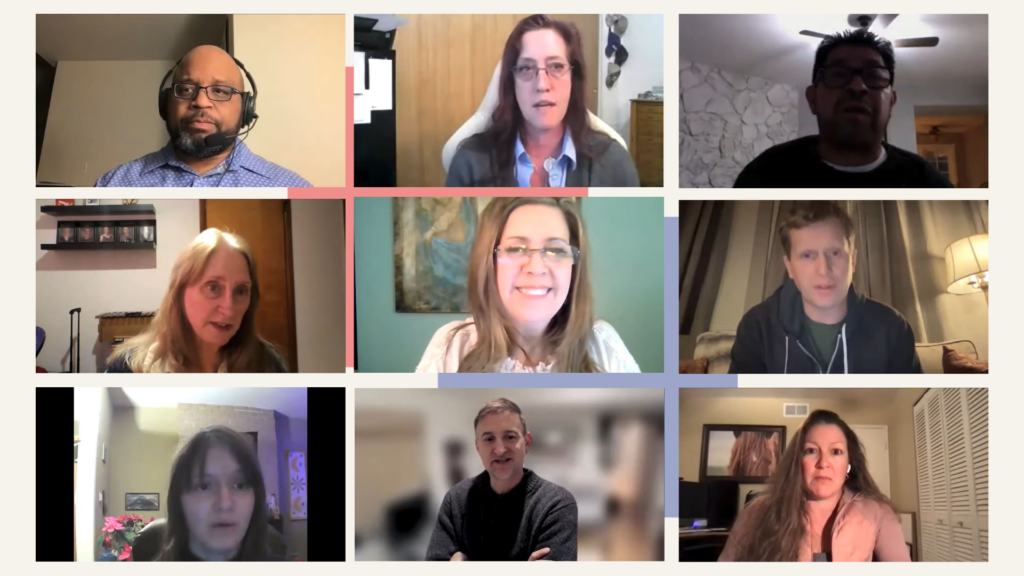“Debate” is such a strong word. At the thought of the word, I think of angry Congressmen coming for each other’s throats. Yet Braver Angels brought a whole new meaning to it in one of the first Braver Angels debates I’ve attended—their latest Braver Angels Community Debate on Homelessness.
I signed up for the debate with no expectations, and from the start, I was impressed—and intimidated.
There were almost 200 participants in the Zoom room. A good 70 people had their cameras on, and there was a diverse array of people of all ages, races, and genders. I had a decent background on homelessness but was nervous about participating or thinking I’d be expected to.
The moment the speeches began, I stopped being afraid.
But what really caught me off guard was how everyone was incredibly respectful, calm, and engaged.
Here’s how the debates are organized: All participants are invited in the Zoom room to either listen in or have the opportunity to deliver a 3-minute-long speech either by agreeing or disagreeing with a proposed resolution on a topic. There is absolutely no pressure to speak, but if you’d like to share your perspective on the issue, you can simply message a staff member, or a “whip,” and you’re put in a queue to start a new discussion. Participants also have the opportunity to ask speakers 1-minute questions about their speech, so everyone is encouraged to engage with the conversation. A moderator, or a “chair,” strictly regulates the flow and format of the discussion, redirecting off-topic conversations and overseeing the pacing and structure of the debate.
At one point, a formerly homeless woman spoke about looking for a roof over her head in the winter while struggling with drug addiction. Everyone in the room was quiet, listening. She recounted the bitter cold and desperation of her time on the streets and how she was able to get out of that situation. There was no judgment or shaking heads on my Zoom screen, but instead a deep sense of understanding and respect for her courage. Participants praised her speech and referenced her experiences continuously throughout the debate. She was heard, and all the participants made sure she knew it.
Another thing that stood out to me was how all the participants presented creative, thoughtful, and considerate arguments and offered their own expertise, stories, and backgrounds to make their case. One participant brought up concerns about how giving people housing without requiring that they have no pets, alcohol or any other conditions would put their neighbors and neighborhoods at risk.
Their concern? That existing neighbors—worried about potential dangers and disruptive behaviors—might leave the neighborhood, worsening the quality of housing and public resources and creating more zoning issues. In a 1-minute response to this statement, another participant asked whether the speaker thought a formerly homeless person who is more involved in their neighborhood thanks to new housing would also feel more responsible for keeping it safe. In a rally of question and answer, each subsequent response gave rise to new doubts and concerns.
Third, most importantly, there was an overwhelming number of diverse voices from all backgrounds and positions that enriched my entire experience. The participants included two formerly homeless speakers talking about their stories and struggles, an economist with experience in urban planning, organizational leaders working directly with the homeless population, and many concerned citizens and neighbors from Seattle, Oklahoma, New York, and other cities and states across the country.
Watching so many people from different backgrounds and perspectives come together in the same space on equal ground over Zoom and treat each other with respect and dignity despite their differences allowed me to restore some degree of hope in how we might bridge our divides. Every speaker was expected to persuade and defend their arguments with logical reasoning and share their experiences to productively add to the discussion. It was beautiful to witness.
I came out of the debate with so much more to consider about the homelessness crisis. Not only did it emphasize the homeless experiences and the work volunteers put in to ensure safe housing but I also weighed in the impact it would have on the economy, zoning issues, and neighbors with children. Are there other alternatives to housing-first policies? Are preconditions necessary? Would counseling and social work be more productive? The more I got to listen to the wide variety of perspectives the people provided, the more I got to understand the heart of the issue at hand and ask the questions many forget to ask about such issues.
In every debate I’ve seen—either on TV, the news, or in a classroom—people seem to be arguing, brutishly, to win an argument. Online, people often talk about these topics in rageful comment sections or judgemental videos. On the day of this debate, though, people were trying to win understanding by sharing their own personal experiences and explaining how they led to their opinions in ways that show that there is never just one right answer to these questions.
And now that I can put faces and stories to the names online, I feel like I can reach a new level of understanding, maturity, consideration, curiosity, and compassion for every perspective and opinion.
If you’d like to check out the next Braver Angels Online Community Debate on Excluding Perspectives, you can learn more and sign up right now on Eventbrite: https://www.eventbrite.com/e/national-debate-excluding-perspectives-registration-267872813797. To check out other Braver Angels content, check out the website https://braverangels.org/.




